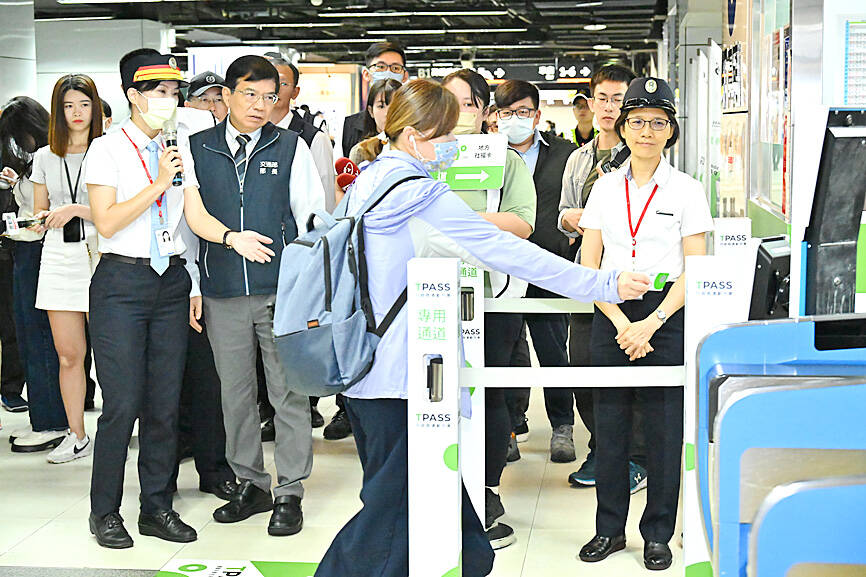Smooth passenger traffic was mostly observed yesterday on the first working day of the TPass monthly transit card program and Minister of Transportation and Communications Wang Kwo-tsai (王國材) said that he hoped that all turnstiles at stations would be able to scan the new cards by the end of the year.
As the program was only finalized in March, the companies only had three months to upgrade the turnstiles and TPass card users have to go through designated gates at Taiwan Railways Administration (TRA) stations, the Taoyuan International Airport MRT Line and the Taichung MRT, Wang said.
The Taipei and Kaohsiung MRT systems had previous experience operating contactless turnstiles for their respective monthly passes, so all their turnstiles are accessible for TPass card users, he said.

Photo: Tu Chien-jung, Taipei Times
The new regional public transport card had been used for an estimated 414,000 journeys since it was launched on Saturday in northern, central and southern Taiwan, Wang said, adding that about 307,000 TPass cards had been sold so far in the three regions.
The TPass issued in Taipei can be used for travel in three other cities in northern Taiwan — Keelung, New Taipei City and Taoyuan — while the other versions cover Taichung and Miaoli, Nantou and Changhua counties in central Taiwan; and Tainan, Kaohsiung and Pingtung County in the south.
In Taichung, use of the TPass also was progressing smoothly yesterday, said the Taichung Transportation Bureau, which reported sales of 17,000 cards since presales began on June 15.
Commuter traffic was also flowing well at the TRA stations in Kaohsiung, although a few people had forgotten to activate their TPass cards and could not get though the turnstiles.
President Tsai Ing-wen (蔡英文) yesterday used a TPass card to travel on the MRT from Taipei to Taiwan Taoyuan International Airport.
She said that transportation is an important part of life, as many people have to commute to work, and she hoped the new monthly pass would help ease the financial burden.
Tsai also encouraged more people to take public transportation to reduce carbon emissions for the sake of the environment.
The central government has allocated NT$20 billion (US$642.4 million) over the next three years to subsidize projects for the implementation of regional monthly transit passes across Taiwan, Wang said.

CHAOS: Iranians took to the streets playing celebratory music after reports of Khamenei’s death on Saturday, while mourners also gathered in Tehran yesterday Iranian Supreme Leader Ayatollah Ali Khamenei was killed in a major attack on Iran launched by Israel and the US, throwing the future of the Islamic republic into doubt and raising the risk of regional instability. Iranian state television and the state-run IRNA news agency announced the 86-year-old’s death early yesterday. US President Donald Trump said it gave Iranians their “greatest chance” to “take back” their country. The announcements came after a joint US and Israeli aerial bombardment that targeted Iranian military and governmental sites. Trump said the “heavy and pinpoint bombing” would continue through the week or as long

TRUST: The KMT said it respected the US’ timing and considerations, and hoped it would continue to honor its commitments to helping Taiwan bolster its defenses and deterrence US President Donald Trump is delaying a multibillion-dollar arms sale to Taiwan to ensure his visit to Beijing is successful, a New York Times report said. The weapons sales package has stalled in the US Department of State, the report said, citing US officials it did not identify. The White House has told agencies not to push forward ahead of Trump’s meeting with Chinese President Xi Jinping (習近平), it said. The two last month held a phone call to discuss trade and geopolitical flashpoints ahead of the summit. Xi raised the Taiwan issue and urged the US to handle arms sales to

State-run CPC Corp, Taiwan (CPC, 台灣中油) yesterday said that it had confirmed on Saturday night with its liquefied natural gas (LNG) and crude oil suppliers that shipments are proceeding as scheduled and that domestic supplies remain unaffected. The CPC yesterday announced the gasoline and diesel prices will rise by NT$0.2 and NT$0.4 per liter, respectively, starting Monday, citing Middle East tensions and blizzards in the eastern United States. CPC also iterated it has been reducing the proportion of crude oil imports from the Middle East and diversifying its supply sources in the past few years in response to geopolitical risks, expanding

OTHER OPTIONS: Given possible US intervention and Taiwanese counterattacks, China might opt to blockade Taiwan or take its outlying islands instead of an all-out invasion A US think tank has urged Taiwan to adopt a “hellscape” strategy that would flood the Taiwan Strait with drones and other uncrewed systems to deter invasion by China. In its report, Hellscape for Taiwan, published on Thursday, the Center for a New American Security said Taipei’s asymmetric defense approach — often described as a “porcupine strategy” — needs to evolve to keep pace with the growing capabilities of the Chinese People’s Liberation Army. The “hellscape” strategy involves saturating the air and waters around Taiwan with thousands of drones and other platforms capable of striking invading forces from multiple domains at once. Long-range